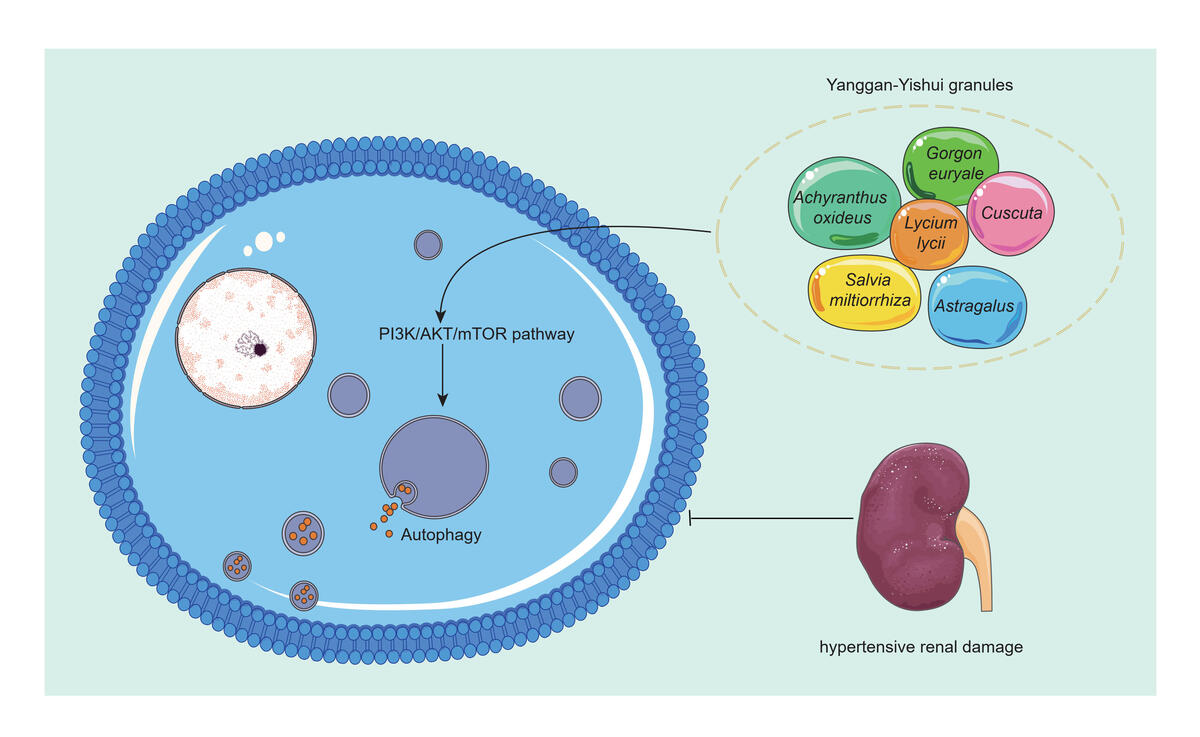Current issue
Archive
Manuscripts accepted
About the Journal
Editorial office
Editorial board
Section Editors
Abstracting and indexing
Subscription
Contact
Ethical standards and procedures
Most read articles
Instructions for authors
Article Processing Charge (APC)
Regulations of paying article processing charge (APC)
IMMUNOLOGY / RESEARCH PAPER
Network pharmacology and in vitro experiments reveal the autophagy mechanism of Yanggan-Yishui granules in improving hypertensive renal injury
1
Research Institute of Acupuncture and Meridian, Anhui University of Chinese Medicine, China
2
Department of Emergency or ICU, Anhui Provincial Hospital of Integrated Traditional and Western Medicine, China
3
The First Affiliated Hospital of Anhui University of Traditional Chinese Medicine, Branch Center of the National Clinical Research Center for Cardiovascular Disease, Cardiovascular Institute of Anhui Academy of Chinese Medicine, China
Submission date: 2024-04-02
Final revision date: 2024-07-02
Acceptance date: 2024-07-03
Online publication date: 2024-07-28
Corresponding author
Jing Wang
Research Institute of Acupuncture and Meridian, Anhui University of Chinese Medicine, Qianjiang Road, 230012, Hefei, China
Research Institute of Acupuncture and Meridian, Anhui University of Chinese Medicine, Qianjiang Road, 230012, Hefei, China
KEYWORDS
TOPICS
ABSTRACT
Introduction:
In China, Yanggan-Yishui granules (YGYSG) have been used to treat hypertensive renal damage (HRD) for over 20 years. Network pharmacology was used to determine whether YGYSG affects HRD via the autophagy pathway, which was verified using in vitro experiments.
Material and methods:
Common targets of YGYSG, HRD, and the autophagy pathway were screened using network pharmacology, and effective compounds, core targets, and signaling pathways were identified. The affinity of the compounds for the core targets was evaluated using molecular docking simulations. Angiotensin II (Ang II) was used to generate an in vitro renal podocyte model using MPC-5 cells. Morphological changes in the autophagosomes were observed using transmission electron microscopy (TEM). The expression levels of autophagy-related and pathway proteins were detected using western blotting and reverse transcription quantitative real-time PCR (PCR).
Results:
Network pharmacology and molecular docking analyses identified eight autophagy-related core targets and ten core components in the YGYSG treatment of HRD. These targets are mainly involved in the phosphoinositide 3-kinase (PI3K)/protein kinase B (AKT)/mammalian target of rapamycin (mTOR) signaling pathway and autophagy-related biological processes. In vitro experiments showed that Ang II-stimulated renal podocytes exhibited abnormal autophagy, and YGYSG protected renal podocytes from abnormal autophagy. In addition, YGYSG reversed abnormal autophagy and improved HRD by activating the PI3K/AKT/mTOR signaling pathway.
Conclusions:
YGYSG may regulate abnormal autophagy in renal podocytes by activating the PI3K/AKT/mTOR signaling pathway and may play a role in improving HRD.
In China, Yanggan-Yishui granules (YGYSG) have been used to treat hypertensive renal damage (HRD) for over 20 years. Network pharmacology was used to determine whether YGYSG affects HRD via the autophagy pathway, which was verified using in vitro experiments.
Material and methods:
Common targets of YGYSG, HRD, and the autophagy pathway were screened using network pharmacology, and effective compounds, core targets, and signaling pathways were identified. The affinity of the compounds for the core targets was evaluated using molecular docking simulations. Angiotensin II (Ang II) was used to generate an in vitro renal podocyte model using MPC-5 cells. Morphological changes in the autophagosomes were observed using transmission electron microscopy (TEM). The expression levels of autophagy-related and pathway proteins were detected using western blotting and reverse transcription quantitative real-time PCR (PCR).
Results:
Network pharmacology and molecular docking analyses identified eight autophagy-related core targets and ten core components in the YGYSG treatment of HRD. These targets are mainly involved in the phosphoinositide 3-kinase (PI3K)/protein kinase B (AKT)/mammalian target of rapamycin (mTOR) signaling pathway and autophagy-related biological processes. In vitro experiments showed that Ang II-stimulated renal podocytes exhibited abnormal autophagy, and YGYSG protected renal podocytes from abnormal autophagy. In addition, YGYSG reversed abnormal autophagy and improved HRD by activating the PI3K/AKT/mTOR signaling pathway.
Conclusions:
YGYSG may regulate abnormal autophagy in renal podocytes by activating the PI3K/AKT/mTOR signaling pathway and may play a role in improving HRD.
Share
RELATED ARTICLE
We process personal data collected when visiting the website. The function of obtaining information about users and their behavior is carried out by voluntarily entered information in forms and saving cookies in end devices. Data, including cookies, are used to provide services, improve the user experience and to analyze the traffic in accordance with the Privacy policy. Data are also collected and processed by Google Analytics tool (more).
You can change cookies settings in your browser. Restricted use of cookies in the browser configuration may affect some functionalities of the website.
You can change cookies settings in your browser. Restricted use of cookies in the browser configuration may affect some functionalities of the website.



